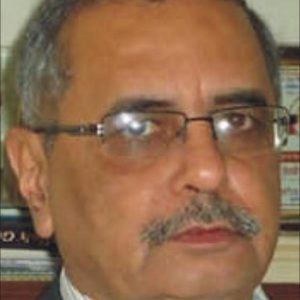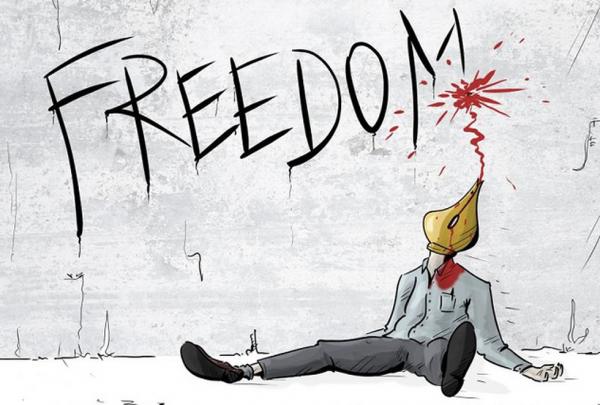

RECENTLY, the Uttar Pradesh police has booked a senior journalist, Supriya Sharma of the Scroll news portal, in a criminal case after she had reported about the conditions in the wake of the sudden lockdown in Varanasi district, falling in the Lok Sabha constituency represented by Prime Minister Narendra Modi.
This latest action comes close on the heels of similar police cases against widely respected veteran journalist Vinod Dua and several others. The onslaught against journalists is not limited to governmental authorities. On June 19, journalist Shubham Mani Tripathi, just 25 years of age, was murdered by sand mafia because he was exposing their nefarious activities.
 The tendentious proclivity to embroil journalists in varied cases and take action against them has emerged as a trend in different states and union territories. But one strain runs common: the authorities are quick to book a journalist if he or she is reporting against the government line or is strident in his/her criticism.
The tendentious proclivity to embroil journalists in varied cases and take action against them has emerged as a trend in different states and union territories. But one strain runs common: the authorities are quick to book a journalist if he or she is reporting against the government line or is strident in his/her criticism.
Surprisingly, the police has even been booking journalists in cases where it has no business to meddle. For example, the sole reason for the police to book the likes of Ramachandra Guha, Aparna Sen, Mani Ratnam and a host of well known and respected opinion leaders, scribes, social scientists and acclaimed economists was just the fact that they had not only raised their voice against mob lynchings and certain government policy moves, but had even dared to write an open letter to the prime minister.
The fig leaf of defence that those persecuting/prosecuting these vociferous citizens cite in their defence is derived from the Supreme Court’s guideline in the Lalita Kumari versus State of Uttar Pradesh (2013) case that laid down that the police was duty bound to file an FIR if an aggrieved person approaches it with a complaint.
Ironically, the apex court’s sole intention was to ensure that a common citizen is not harassed and the police be made duty bound to take on record the grievance.
Instead, a variety of anti-social elements found an opportunity in the pronouncement of the apex court and the Lalita Kumari judgement is being misused in cahoots with the police that cannot escape its own role in the state of affairs.
During the recent elections to the Delhi Assembly, several leaders associated with the party ruling at the Centre made blatantly hateful speeches, so much so that the Election Commission of India was forced to gag them for certain number of days during the election campaign.
Several public-minded citizens and activists reached out to the police and even the courts but for inexplicable reasons, these merchants of hate were not booked.
Terming the latest action against Scroll journalist Supriya Sharma, retired Supreme Court Justice Madan B Lokur said: “The freedom of the press, free speech and expression are under threat.”
The Editors Guild of India called it an “overreaction” that “will seriously undermine freedom of the media.” It said the “increasing frequency of such misuse of laws” has been “destroying a key pillar of India’s democracy.”

The highly regarded Paris-based Reporters Sans Frontieres (RSF), or Reporters Without Borders, that works to document and combat attacks on journalists around the world, has ranked India 142nd on global press freedom index, just a notch above Pakistan (145), Russia and Turkey, and a world removed from Norway. Britain, The Netherlands, New Zealand etc, that value media freedom.
More than ten thinkers, poets, social and democratic rights activists are currently languishing behind bars in the Bhima Koregaon case. Some of the world’s leading lights have made appeals to the government on their behalf, but the government is projecting them as some kind of a threat to the country. They are not dreaded criminals but highly regarded men and women of letters and deeds who could be the pride of society.
There has been a persistent attempt to project a singular narrative about the Bhima Koregaon case, projecting as if these social activists and scholars were somehow a part of some henious conspiracy against the state. A similar narrative is now being pushed in the context of Delhi violence earlier this year, twinning the targetted attacks with the strident anti-CAA movement.
Some student leaders and social activists have already been arrested while the names of Harsh Mander, Yogendra Yadav etc have also been dragged into the row, a move not very different from how a colonial power would routinely embroil citizens in alleged conspiracies.

India recently witnessed political forces of various hues not only castigating the 1975 Emergency but also expressing concern that the current situation in the country was worse than those dark days.
The Bhartiya Janata Party’s (BJP’s) earlier avatar, the Jana Sangh, projected itself as an advocate of democracy and did oppose the Emergency in the mid-70s, but the Indian democracy suffered routine setbacks during its regime since 2014. Not even during the Emergency were so many journalists, thinkers, scholars, artistes or social activists were targeted for not towing the official line.
At the same time, vast sections of the media seem to have shunned their primary duty to act as a watchdog and keep an eye on transgressions by the ruling elite; instead, they have made the opposition parties their prime target. No wonder that such a culture of embedded media gace rise to the rather unique term, ‘Godi Media’, explaining a lot of what ails this fourth pillar of democracy.
Freedom of expression and ideas is the foundation on which any democracy rests. In his 1644 classic, Areopagitica, the impassioned philosophical defence of the principle of the right to freedom of speech and expression, John Milton had said that the right to put forth the views before the Parliament was a matter of such freedom. Stressing the need to present the truth to the people, he had equated truth with God. At the time, Milton was opposing a law that required authors to seek a government license before their work could be published.
These were also the same times when our Sufi poets were equating God, Truth and Justice.
Recalling the vociferous struggles waged by journalists and people during the reign of Henry VIII, Queens Mary and Elizabeth and King James, Karl Marx said: “The freedom of the press…constitutes right, because it is the positive existence of freedom. It must therefore exist, even if it is never put into application…censorship, like slavery, can never become lawful… Freedom of the press is as responsible for the “changeable conditions” as the astronomer’s telescope is for the unceasing motion of the universe.”
He was not only committed to the freedom of the press, but also very sensitive in this respect. Mark the sensitivity with which he wrote: “You think it barbaric to blind nightingales, but it does not seem to you meaningless at all or barbaric to gouge out the eyes of the press with the sharp pens of the censorship.”
“You regard it as despotic to cut a free person’s hair against his will, but the censorship daily cuts into the flesh of thinking people and allows only bodies without hearts, submissive bodies which show no reaction, to pass as healthy!”
When was the last time you heard our rulers arguing along these lines? Of course, it is ironical that the regimes built ostensibly on the philosophical foundations of Marxism gave short shrift to the same freedom of the press.
 In spite of such a dim scenario, a surprisingly large number of journalists have dug in their heels, committed themselves to the democratic ideals and have stuck their neck out for their beliefs and what they see as their prime duty.
In spite of such a dim scenario, a surprisingly large number of journalists have dug in their heels, committed themselves to the democratic ideals and have stuck their neck out for their beliefs and what they see as their prime duty.
It is not easy to fight for one’s principles, for things like justice, truth and freedom. As a sage said, “the primary condition for freedom is to first know your own self, and that is hardly possible without first owning up one’s own faults and mistakes.”
To raise your voice, you have to struggle against your inner demons, marshal your inner resolve. There’s hesitation, a million doubts come gnashing at you and you have to stand your grounds, a situation best described by Baba Bulle Shah:
ਝੂਠ ਆਖਾਂ ਤੇ ਕੁਝ ਬਚਦਾ ਏ
ਸੱਚ ਆਖਿਆ ਭਾਂਬੜ ਮਚਦਾ ਏ
ਜੀ ਦੋਹਾਂ ਗੱਲਾਂ ਤੋਂ ਜਚਦਾ ਏ
ਜਚ ਜਚ ਕੇ ਜੀਭਾ ਕਹਿੰਦੀ ਏ।
I stand to gain if I lie
Flames come leaping if I tell the truth
I fear both
My fearful tongue hesitatingly says the truth!
So, the truth does eventually spill out, perhaps hesitatingly, perhaps in dribs and drabs, but in the end, always.
As that French abstruse theorist, Jacques Derrida, said: Democracy, like freedom, is a promise. It is never fulfilled, is indefinitely deferred; and we have to forever fight for it.
We need to wage that fight, and we need to wage it today, tomorrow, and the day after, and for all times to come. This is not a battle that is going to end anytime soon.
As Karl Marx put it — “Freedom of the press, too, has its beauty…which one must have loved to be able to defend it. If I truly love something, I feel that its existence is essential, that it is something which I need, without which my nature cannot have complete existence.”
Freedom of the press is essential to safeguard the rights of the people, to safeguard democracy itself. The democratic forces need to stand up and raise their voice loudly for those journalists who are standing up and are being counted by both sides. Us, and them. It’s war. And you need to join forces!
(English translation of Dr Swarajbir’s piece, ਪ੍ਰੈਸ ਦੀ ਆਜ਼ਾਦੀ ਨੂੰ ਖ਼ਤਰਾ, published in the Punjabi Tribune of July 22, 2020.)

Disclaimer : PunjabTodayTV.com and other platforms of the Punjab Today group strive to include views and opinions from across the entire spectrum, but by no means do we agree with everything we publish. Our efforts and editorial choices consistently underscore our authors’ right to the freedom of speech. However, it should be clear to all readers that individual authors are responsible for the information, ideas or opinions in their articles, and very often, these do not reflect the views of PunjabTodayTV.com or other platforms of the group. Punjab Today does not assume any responsibility or liability for the views of authors whose work appears here.
Punjab Today believes in serious, engaging, narrative journalism at a time when mainstream media houses seem to have given up on long-form writing and news television has blurred or altogether erased the lines between news and slapstick entertainment. We at Punjab Today believe that readers such as yourself appreciate cerebral journalism, and would like you to hold us against the best international industry standards. Brickbats are welcome even more than bouquets, though an occasional pat on the back is always encouraging. Good journalism can be a lifeline in these uncertain times worldwide. You can support us in myriad ways. To begin with, by spreading word about us and forwarding this reportage. Stay engaged.
— Team PT


Copyright © Punjab Today TV : All right Reserve 2016 - 2024 |